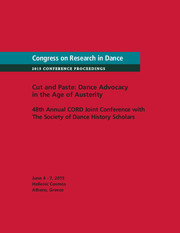Article contents
Globalization and Dance in West Africa
Published online by Cambridge University Press: 04 January 2013
Abstract
Dance in most African countries, especially in West Africa, is the responsibility of a particular class of the society. The main issue for performers or choreographers trained in modern standards is the transfer of information to dance professionals who are illiterate, approximately 75 percent of noneducated people on the continent. The majority are women. It is an oral tradition too, so diversity, globalization, and feminism mean nothing to them. The sociopolitical situation of the entire continent is a good example of the consequences of colonization that, besides being a historical big mistake, was also a disaster because it did not respect the structure of societies. Today's globalization of the world draws the continent down because it cannot consider Africa's specific needs. To me, dance cannot be globalized because of the creativity, identity, and social-specific values that would die.
- Type
- Research Article
- Information
- Copyright
- Copyright © The Author(s) 2008
References
Works Cited
- 1
- Cited by




